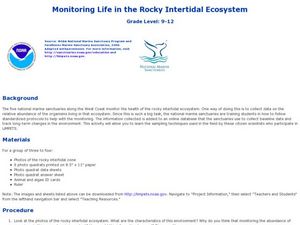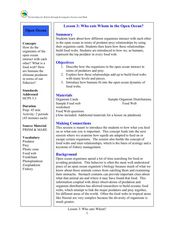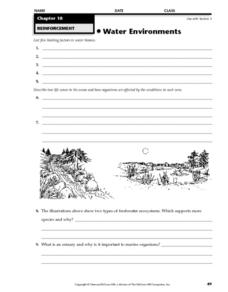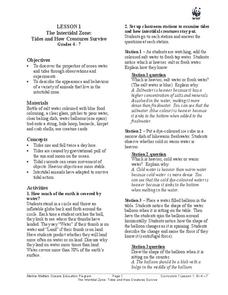Curated OER
Specialized for the Sea
Students use pictures and make a mural to investigate how ocean animals are adapted to certain parts of their environment.
Curated OER
Ocean Life Zones
In this ocean worksheet, students answer questions about ocean life, the plants and animals of the ocean and their classification, the major life zones of the ocean and questions about an animal of their choice that lives in the ocean.
Curated OER
Marine Communities
Students view a video and then complete lab exercises to help them explain marine communities and animals in them.
Curated OER
The Dead Zone: A Marine Horror Story
Students graph dissolved oxygen versus depth using data taken from NECOP Program. In this marine science lesson, students explain the causes of hypoxia. They recommend possible solutions to this problem.
Curated OER
Monitoring Life In The Rocky Intertidal Ecosystem
Students investigate marine life by researching aquatic organisms on the Internet. In this oceanography lesson, students monitor algae and animals of the ocean by identifying their population and habitat on data sheet ID cards. Students...
NOAA
I Can't Breathe!
The Gulf of Mexico dead zone, an area of low oxygen that kills marine life, costs the United States $82 million every year. Young scientists research anoxic ocean environments then come up with a hypothesis for the cause of the Gulf of...
Curated OER
In The Zone
Third graders identify ways that ocean animals grow, survive, reproduce, and adapt. They use computer Internet skills to acces and collect information. They create a PowerPoint presentation. They demonstrate writing skills throughthe...
Curated OER
Who Eats Whom in the Open Ocean?
Students examine how organisms interact with one another in the ocean. In this science lesson, students discuss predators and prey in the ocean. Students discuss food webs and how organisms interact with each other.
Alabama Learning Exchange
Diverse Life Forms of the Ocean
Students recognize marine organisms and differentiate between plankton and nekton. In this investigative instructional activity students create a concept map using their list of terms and study marine life forms.
Curated OER
Plankton / Phytoplankton
Learners discuss the importance of plankton in the ocean ecosystem. For this biology lesson, students identify the different types plankton by observing them under the microscope. They explain how plankton population affect global climate.
Curated OER
The Ocean Floor and Shore Zones
Make textbook reading more engaging using this reading activities learning exercise, through which scholars review major features found on the ocean floor and the processes that formed these features. They complete 11 terms in a...
NOAA
Tides
Low tides, high tides, spring tides, neap tides, diurnal tides, semidiurnal tides, mixed tides ... just how many types of tides are there? The 10th installment of a 23-part NOAA Enrichment in Marine sciences and Oceanography (NEMO)...
Curated OER
Oceans
Students complete a unit of activities to learn about ocean life as well as improve their math and measurement skills. In this ocean life and math skills lesson, students complete 8 lessons to learn about ocean life and complete...
Curated OER
The Intertidal Zone: Tides and How Creatures Survive
For this intertidal zone worksheet, students study the various marine life creatures and list the characteristic that allows them to stay put in the intertidal zone. Students then draw or cut and paste the marine life and seaweed into...
Curated OER
Salt Water Revival
Students produce a high tide. In this Marine Biology lesson plan, students visit a tide pool to investigate the creatures response to changes in the tide. Students discuss the results of their experimentation.
NOAA
Fishy Deep-sea Designs!
Oceans represent more than 80 percent of all habitats, yet we know less about them than most other habitats on the planet. The instructor introduces the epipelagic, mesopelagic, bathypelagic, twilight, and midnight zones in the ocean....
Curated OER
Ocean Habitats:
Students investigate the creatures of intertidal zones. They explore the adaptations species make to survive .
Curated OER
Water Environments
In this water environments worksheet, students will brainstorm limiting factors in water biomes, describe the two life zones in the ocean, and compare two types of freshwater ecosystems. This worksheet has 9 short answer questions.
Curated OER
The Intertidal Zone: Tides and How Creatures Survive
Young scholars study the properties of ocean water and tides and learn about animals that live in intertidal zones. In this intertidal zone instructional activity, students participate in classroom stations to learn about fresh water and...
Curated OER
Create an Underwater Scene
Students apply knowledge of underwater ocean life by creating an ocean life scene with marine animals and plants placed at appropriate ocean depths.
Curated OER
Wildlife
First, biology pupils research land and marine habitats along the route of skipper Rich Wilson's Great American II. Then, using colored paper clips scattered across a colored paper background, they play the predator-prey game to...
Curated OER
The Magic School Bus Goes to Mussel Beach
Students participate in a hands-on activity where they explore tidal zones. They explore tides and marine life. This is an experiment that can be accomplished in class.
Curated OER
Ocean Tides
In this ocean tides instructional activity, students read 2 pages about ocean tides and answer true or false questions about it. Students complete 10 questions.
Curated OER
Ocean Water and Life
In this ocean water and life worksheet, students match the vocabulary term with the correct definition. Also, students answer questions by deciding if the statements are true or false. Finally, students complete concepts maps while using...

























